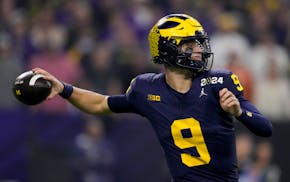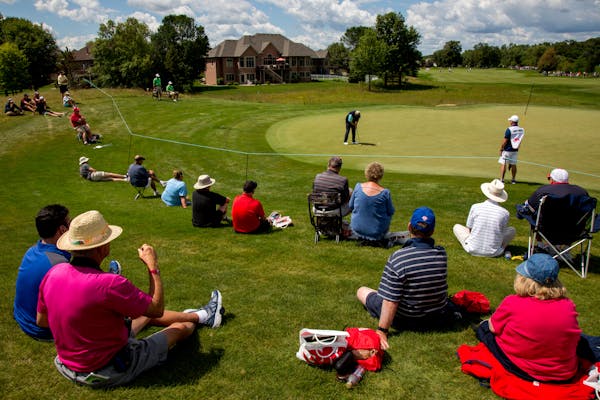If you were lucky enough to find yourself standing by the seventh green of Torrey Pines' south course on the afternoon of June 16, 2008, you were struck by the sounds of silence. Hang gliders hovered nearby, waves crashed onto the beach below, and thousands of people who had rushed to the grandstand willed themselves not to cough.
Tiger Woods had made a curling putt on the crusty 18th green on the 72nd hole Sunday of the U.S. Open to force an 18-hole Monday playoff with Rocco Mediate. When they remained tied after 90 holes, they shifted from the 18th green to the nearby seventh tee to begin a sudden-death playoff.
As they approached the seventh green, both appeared solemn. Mediate had spent the tournament chuckling like a guy who had won a "Play Golf With Tiger'' sweepstakes. As a reporter with inside-the-rope privileges, I had squatted by the 16th tee box earlier Monday, and Mediate had chatted up a few of us and joked with his caddie, while nearby Tiger stared into the distance.
Now, on the 91st hole, the tournament was about to end. Mediate had pulled his drive and his approach, forcing him to take a drop near the grandstand. At the end of five days of spectacular, dramatic golf, Mediate bogeyed while Woods made a routine par, then hugged his caddie, Steve Williams, in relief.
Woods was 32. He had just won his 14th major title, leaving him four shy of Jack Nicklaus' record. The penultimate paragraph in a column on Woods in the Star Tribune the next day read: "There are five majors remaining before Hazeltine National hosts the 2009 PGA Championship. If Woods wins three of the next five, he could tie Nicklaus in Minnesota."
That hardly seemed implausible. Woods had won 14 majors in 11 years in the most dominant display of golf in the game's history.
Woods called the victory at Torrey Pines his "best'' performance. What we know now is that he won on a shattered left knee that caused him to recoil in pain immediately after contact on his full swings. That his personal life soon would become tabloid fodder. That he would continue to experience physical setbacks. And that he would enter the 2018 U.S. Open, 10 years after perhaps his most dramatic major victory, stuck on 14 majors.
When Woods lost a Sunday showdown with Y.E. Yang at Hazeltine in the 2009 PGA, he lost his last, best chance to win a 15th major.
By losing that playoff to Woods, Mediate placed himself in intriguing company. Woods played in three major playoffs, against Bob May, Chris DiMarco and Mediate. May was the ultimate long shot; DiMarco and Mediate were solid pros who had chances to define their careers by making just one more putt down the stretch against the champ.
"Nothing he does surprises me," Mediate said. "It was fun to turn the tables on him for a while, though.''
Mediate became an apt narrator for Woods' weekend. I was among the reporters gathered at the 72nd hole, when Woods made a bumpy, sliding putt to force the playoff. Ron Kroichick of the San Francisco Chronicle and I debated whether Woods could summon the kind of sorcery that had defined his career. We guessed that he would, and later found out that Mediate was saying the same thing to anyone who would listen.
The putt dropped. Woods exulted. The playoff was on.
In more than 30 years of sportswriting, walking alongside Woods that week might be my career highlight.
Usain Bolt eating up the stagger on the curve of the 200. Michael Jordan and Magic Johnson playing mere yards away from a courtside seat. Kirby Puckett holding court in the Twins clubhouse. Lindsay Whalen winning as a collegian and a pro at Williams Arena. These are moments you never want to forget.
Walking with Woods as he won on a shattered knee ranks high, regardless of his fall from grace.
Jim Souhan's podcast can be heard at MNSPN.com. On Twitter: @SouhanStrib
E-mail: jsouhan@startribune.com

Souhan: Wolves fans made Game 1 special. Now bring on Game 2.

Souhan: Should Vikings even consider McCarthy in NFL draft?

Souhan: NAW erases Suns' lead, Game 1 advantage with big performance

Souhan: This is KAT's chance to prove Flip Saunders was right


